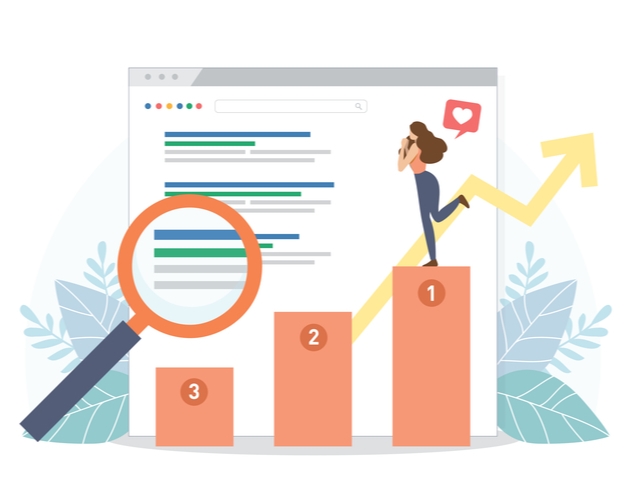What is SEO?
Short for “search engine optimization,” SEO is all about getting your website to rank higher on Google and other search engines so that you can get more organic traffic to your website.
Because search engines want to provide users with helpful, relevant search results, by optimizing your site around the right keywords, you can create a better user experience and increase your chances of ranking higher and getting more high-quality traffic.
SEO encompasses a slew of tactics, including keyword optimization on your website, using schema to help search engines better understand what your website is about, link building to bolster authority, and reputation and review management to engender trustworthiness.
Dispensary SEO Questions: What is Local SEO?
You may have heard the term “local SEO” and wondered how it differs from regular SEO.
Local SEO concerns itself with “local searches,” which are searches that require geographic information.
If you’re doing a search for a restaurant near you, you don’t want results for another state. The same goes for dispensaries.
Most dispensary searches will be local searches where people want to know about the shops near them. We take this into account when creating an SEO strategy and focus primarily on local SEO since that is what will lead to sales for our customers.
Ultimately, SEO and local SEO are the same thing. There is just more importance placed on geographic keywords, local schema, your Google My Business profile, and your reviews when focused on local SEO for dispensaries.
Why does SEO matter?
When customers want to find a dispensary near them, they turn to search—and Google, in particular. And if you want to show up in those search results, then it’s crucial that you have a robust SEO strategy and a team to implement it. Otherwise, searchers will go right to your competition.
Over 30% of clicks go to the first organic search result. Imagine getting that much traffic to your website! And if you aren’t in the number one spot, moving up a spot can increase your clicks by up to 30%.
Higher rankings generally align with more traffic. And if done right, that traffic will be comprised of people who are interested in your business and who may want to buy from you.
SEO also helps you create a better user experience. You want people to easily navigate your site, whether they’re on a desktop, a tablet, or a smartphone. By following SEO best practices, you’ll make it easier for customers to find you and make your website more user-friendly at the same time.
SEO also helps you decrease your customer acquisition cost. Most of your marketing efforts are aimed at getting new customers. When you make SEO part of your digital marketing strategy, you pay less to drive new traffic to your site. In fact, with SEO, you can pay less than a dollar to acquire a new customer. That’s one of the best customer acquisition costs we’ve seen!
What is organic traffic?
Organic traffic is web traffic that you don’t pay for.
So, when you run Google Ads, you’re paying for traffic, but when you do SEO, you’re trying to increase your unpaid organic traffic from search results.
This traffic may be from people who are searching for your dispensary (a direct search) or for individuals just looking for a dispensary near them (a discovery search). It can also be from a branded search, which includes searches of cannabis products or your competitor’s names.
Is SEO different for dispensaries?
Nope! SEO is the same across all industries. The same key components are crucial, including relevant content, securing reviews, and optimizing for industry appropriate keywords.
Dispensary SEO Questions: Do I need to worry about compliance?
Your website should have an age gate and a disclaimer in your footer. Otherwise, there are no regulations against doing SEO. It is a completely compliant method of getting more website traffic. You can run SEO for your Canadian dispensary without fear of Health Canada cracking down on you, and you can run it in the US without regulations. The only concern is ensuring you are using “white hat” methods to avoid running afoul of Google.
How do you increase rankings?
Google rankings are representative of how relevant Google thinks a website is for a particular query. We’ll address both your on-site SEO and off-site SEO to help showcase your website’s relevance.
After fixing any technical SEO issues, addressing on-site and off-site ranking factors, and optimizing for the most relevant keywords, your site should see more organic traffic.
We can’t guarantee that your website will move up in the rankings—only Google can do that—but we’ll strive to get your more sales through organic search results. We’ll also provide reporting so you can see your website’s progress.
What changes will you make to my website?
When we start working with a new client, we take a look at their website and their off-site web presence to see what changes will allow us to create the biggest impact. This is part of an SEO audit that we complete.
The changes needed differ from dispensary website to dispensary website. To learn more about how we can help you specifically, schedule a strategy call.
More broadly speaking, we look at where your site is ranking in Google and how well your competitors’ sites are ranking. We identify issues such as missing title tags and meta descriptions and optimize everything that we can. We ensure that your website is loading quickly and that it looks good on mobile devices.
The following are some of the main issues we find.
Missing tags
Your website should have relevant heading and title tags. Plus, your images should have appropriate alt tags that include your keywords. According to SEMrush, missing tags is the number one on-site SEO mistake.
Missing meta descriptions
Each of your pages and blog posts should have a unique meta description that tells visitors (and Google) what they’ll find when they click your link. (When you do a search, the info under the link is the met a description.)
Site Architecture
How your site is organized matters. It needs to be organized in a logical fashion that makes sense to Google and users.
Your homepage is your primary page, and then you have pages “branching” off from it. This will include your location and menu pages, your blog, and additional resources. If you have multiple locations, for example, you’ll want to have a location page that then links out to all of your locations.
Let’s say your initial homepage is mydispensary.com. Your location page will then be mydispensary.com/locations (or dispensaries) and then the individual location pages will branch out from there:
- mydispensary.com/locations/sacramento
- mydispensary.com/locations/san_diego
- mydispensary.com/locations/los_angeles
The top of your page should also have a site map (menu) that helps visitors find exactly what they’re looking for. We keep it simple. Locations, About Us, Blog, and Menu are generally sufficient.
Site Security
Your site should be secure. It needs a valid SSL (secure socket layers) or TLS (transport layer security) certificate. If your web address starts with “https,” your site is currently secure.
Slow Page Speed
Large images and lots of media can make your website load slowly. Not only do users not like this (they’ll bounce if it takes too long), but Google doesn’t like it either. Remember, Google wants to make sure that its users have a good experience on the sites they link out to. They check your page speed and will promote other pages if yours takes too long to load.
Word Count
We’re sure you have a lot to say. Unfortunately, some websites don’t share enough information. Being light on text can be visually appealing, but you need to weight that with the SEO benefit of having informative, keyword-rich text. We can create additional content on webpages when a page will benefit from it.
Keyword Stuffing
Back in the early days of SEO, stuffing keywords everywhere was a popular tactic. Now, this can get you in the Google hot seat and negatively impact your page rank. We can create copy that is optimized for SEO while still being easy for customers to read.
Links
Internal links are important for detailing your site structure and connecting your content. They help highlight the relevancy of your content and show Google that you know what you’re talking about.
Schema
Schema is a type of web language that tells Google what’s on your page. It’s coded, so you and your visitors won’t see it, but it will help boost your SEO by providing the information Google needs to best “understand” your site.
New Content
In some cases, websites may need additional pages or content. This may be for a variety of reasons. Sometimes this is done solely to improve page ranking by utilizing additional keywords. Other times, it’s needed in order to create a more logical site map or to supply useful information for your customers (like a delivery FAQ).
Mobile-Friendliness
If you want to rank well, your site must look good on mobile. Right now, 50% of the world’s internet traffic is from mobile devices. That means many of your web visitors will be using a smartphone to access your site. Knowing this, Google has made mobile responsiveness one of its ranking factors. We’ll verify that your site loads well and looks good on a variety of mobile devices and recommend changes as necessary.
New Website
If your website needs a lot of work, we may also recommend a new one. We have pre-optimized website themes that we’ve built to be high-converting dispensary websites with prominent CTAs, the recommended site architecture, and more.
Off-Site SEO
Ultimately, your website is only one part of your SEO strategy. In addition to changes to your site, we’ll also work on your off-site SEO, including optimizing your Google My Business profile, link building, and review management. These are especially important for local SEO since Google wants to share results that are relevant and helpful. If you have poor reviews, you will not fare as well as dispensaries in your area with better reviews. The same is true if you haven’t filled out your Google My Business profile.
What can affect my rankings?
A variety of things can affect how well you rank on Google. The number one thing, of course, is the Google algorithm itself. Google wants websites to showcase their expertise, authoritativeness, and trustworthiness.
They use a variety of indicators to measure these subjective characteristics. For example, they check your Google My Business profile. You’ll want to make sure that your information is the same on your profile as it is on your website.
They also like fresh content, so you should be updating and adding pages or blog posts to your website regularly. This content should be centered around industry keywords and topics.
Your reviews will also affect your rankings, especially locally. Make sure to ask customers for reviews regularly and to respond to both positive and negative reviews.
These are just a couple of things that can affect your rankings. To learn more about other ranking factors like link building, schedule a call.
How do you measure the effectiveness of your SEO strategy?

To make sure we’re delivering results, we monitor organic traffic through SEO tools like Google Analytics and Ahrefs. This lets us see a variety of things.
We track the following:
- Traffic: To ensure that your efforts are working, you need to track how many visitors come to your website. With Google Analytics, you can see the traffic for all of your pages, including your home page, your location page, and to your online menu page.
- Bounce Rate: Your bounce rate is the percentage of people that leave your website after visiting only one page. If certain pages have a high bounce rate, you may need to reconsider your content or how your pages are organized. Other pages, like the order confirmation page, will inevitably have a high bounce rate because users have finished using your website.
- New & Repeat Visitors: Of course, you want to know how many people are visiting your website. You also want to know how many of those individuals have visited your website before and how many are visiting it for the first time.
- Sessions: Sessions are synonymous with visitors. This tells you how many times users have visited your website in a set period.
- New Session %: Tracking your new session percentage lets you see how many new visitors you’ve drawn to your website in relation to repeat visitors.
- Average Session Length: This is how long, on average, people stay on your website. If you have a low session length, you may need to look at your site architecture or landing pages to ensure they are easy to use and that they are helping to convert visitors.
- Pages per Session: Pages per session is the number of pages a visitor engages with during their session.
- Transactions: This is the number of total transactions that are attributable to organic search traffic.
- Revenue: The total sales amount for transactions attributable to your organic search traffic.
- Conversion Rate: A conversion is the completion of a desired action. You may have multiple conversions that you want to track. For example, you may want to monitor how many email or SMS signups you get, how many people filled out a particular form, and how many people clicked through to your menu.
- Ecommerce Conversion Rate: This conversion rate is concerned solely with the percent of individuals who visit your website and make a purchase.
- Average Order: The average order is the revenue attributable to organic traffic divided by the number of transactions attributable to that same traffic.
We also offer revenue attribution, which is the practice of tying transactions back to particular marketing efforts. This means that we can tell our clients how many transactions and how much revenue are generated thanks to organic traffic or other digital marketing strategies like Geo-Ads and Google Ads.
Can I stop doing SEO?
You can stop doing SEO, however, you will likely start to see your search results and organic traffic decline over time.
While algorithm changes will impact your rankings, so will other dispensaries’ SEO practices. So if you stop doing SEO and they continue working on the SEO, they will start climbing up the rankings while your site may start falling in the rankings.
How long does it take to see results?
SEO is a long-term strategy. While PPC ads like Google Ads will lead to an increase in (paid) traffic to your site immediately, SEO will drive more organic traffic to your site over time. Results will vary depending on the state of your website, how crowded your local market is, and your current SEO strategy, if any.
The bottom line: You won’t see results overnight. It does take time for the results to take effect. We recommend waiting at least 6 months before expecting to see results. If you want to achieve faster results, you can combine your SEO efforts with Google Ads.
Do I still need SEO if I use PPC ads?

Yes! While PPC ads can help you boost your traffic for a certain period of time, once they are turned off, so is that funnel of traffic. SEO can help you maintain a stream of high-quality, organic traffic and is a longer-term solution for building brand awareness.
Why do I need an ongoing SEO service?
While you will see results from investing in SEO for a short period of time, those results will diminish with every Google algorithm change. Plus, because Google is constantly checking for updates, you want to ensure that you’re actively updating your website and participating in SEO activities that continue to boost your website.
Can you guarantee my search rankings?
No, unfortunately, we can’t. And if someone tells you they can, they’re lying. Only Google can guarantee search results, and they don’t.
My rankings are fine, why do I need SEO?
While your rankings may be fine now, they do change over time. Google is constantly tweaking its algorithm to help ensure that the search results they provide are relevant and useful. If you aren’t investing in SEO, your site may be negatively affected by these algorithm updates.
Rather than being reactive and starting SEO after slipping in the rankings, being proactive and investing in SEO can help prevent future ranking slips and help you build your domain authority.
I did SEO before and didn’t see any results.
Ok, this isn’t a question, but because there are a lot of SEO agencies out there, we thought it was important to address results.
First, it takes time to see SEO results. Plan to stick with a strategy for at least 6 months. If you don’t wait that long, you probably won’t see results.
Second, many marketers have a hard time linking their SEO work with sales. At MediaJel, we’re all about showcasing how our efforts are helping our clients. We provide our clients with transparent reporting so that you’ll always know how your SEO strategy is faring. We’ll help you see how many sales are a result of your SEO strategy and provide insight into different tactics that can help you gain even more organic traffic.
Will there be times that your SEO will seem stagnant? Yes. But that doesn’t mean your strategy isn’t working. Keeping your spot, especially if it’s a good one, is just as important as increasing your rankings.
Is SEO Really Worth it?
Yes! Most of our clients have discovered that SEO is responsible for most of their web traffic! It’s a pretty crucial component of a digital marketing strategy. Check out our case studies to see how SEO has helped our clients increase their reach and their revenue.
Have other dispensary SEO questions? Contact us for an answer!





